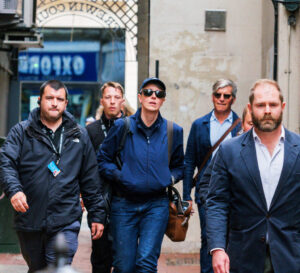Twenty years ago, the slur of “Terf” had not been invented, and the concept of gender ideology was confined to university lectures on Judith Butler. Radical feminists were fighting for the rights of women, and everyone knew they didn’t have penises. But then, something changed.
Back in January 2004, the year I left academia to become a full-time journalist, I wrote a column for Guardian Weekend Magazine on the issue of transsexuality. It was entitled “Gender Benders, Beware”. It wasn’t the first time I had written about the issue. But this piece in particular lit the touchpaper for a fire that is still burning even today.
I wrote it on the suggestion of the magazine’s editor, Katharine Viner. She wanted, she said, something about the trans issue. At that point, I mainly wrote about male violence, and sometimes lesbian politics. I had no other direction from her, except the deadline. So I wrote about how a bastardised version of “human rights” was being used against women, with Vancouver Rape Relief (VRR) as an example.
In August 1995, two of VRR’s employees had asked Kimberly Nixon, a trans-identified male, to leave its counsellor training as they thought it might not be appropriate for a man to be treating abused women. Nixon immediately filed a human rights complaint and began suing VRR. The legal battle was long and arduous. In 2002, Nixon won $7,500, the highest amount ever awarded by the tribunal, for injury to “her dignity”. But when I wrote my piece, that decision had just been overturned.
Here’s a taster: “…having not experienced life as a ‘woman’ until middle age, Nixon assumed ‘she’ would be suitable to counsel women who have chosen to access a service that offers support to women who have suffered similar experiences, not from a man in a dress! The Rape Relief sisters, who do not believe a surgically constructed vagina and hormonally grown breasts make you a woman, successfully challenged the ruling and, for now at least, the law says that to suffer discrimination as a woman you have to be, er, a woman.”
It was like a bomb going off. The letters page exploded. Two-hundred-odd complaints landed and, in his weekly column, the readers’ editor felt bound to apologise on behalf of the newspaper, claiming my words had: “…abused an already abused minority that The Guardian might have been expected to protect”.
This was my Rubicon. The gay press, which had never been fond of me, pretty much declared war and I became a figure of hate for transactivists. The Guardian was and is the only newspaper that employed a dedicated “readers’ editor” to whom complaints can be made about anything that appears in the publication. The organised lobby of transactivists availed themselves of the opportunity to make a huge scene about my piece, claiming that it was an incitement to violence and warning that no LGBT person would read the paper again unless I was fired.
Viner defended me to the hilt and continued to commission me. But these were just the starting salvos in a war of attrition waged by the transactivists: I received death and rape threats, and would be met by a baying mob of protesters wherever I appeared to do a public presentation.
If I thought things were bad, I drew some comfort in being shortlisted for the 2008 Stonewall Journalist of the Year Award. Back then, I was still the only out lesbian journalist in mainstream media and I was writing about issues that were vitally important to lesbians and, indeed, women. Alas, what should have been a moment to actually celebrate my achievements for the under-represented became an opportunity for transactivists to target me. One Stonewall insider told me they were getting up to 20 calls a day demanding my removal from the shortlist. And as I arrived at the ceremony, I was greeted by a 200-strong picket made up of trans people and allies, all screaming “Bindel the bigot!”, “transphobe!” and other such terms of endearment. This, it later transpired, was the largest ever transactivist demo in the UK: effectively, the dawn of the modern trans rights movement.
And no, even though I was the firm favourite, I didn’t take home the prize — it went to Miriam Stoppard, the Daily Mirror’s Agony Aunt who had offered decent advice to a reader whose son had come out as gay in one of her columns. A win by me, I was told by one insider, could have “ruined Stonewall”.
Instead, the mob tried to ruin me. Invitations to prestigious events were withdrawn. I was shortlisted for awards, only to be un-shortlisted when the organisers found themselves under pressure. And in 2009, I became the first individual, alongside six fascist organisations, to be no-platformed by the National Union of Students. And as my name became dirt, the influence of transactivists grew.
By 2011, the media had begun platforming transwomen. Juliet Jacques was charting their “transgender journey” in The Guardian, and Channel 4 screened the reality series, My Transsexual Summer. In 2012, Trans Media Watch (TMW) a tiny charity with massive power gave evidence to the Leveson Inquiry, claiming that coverage in the mainstream media was almost always prejudicial. TMW began flexing its muscles with the big news outlets, offering “training” and “advice”. And, suddenly, the trans issue was everywhere. Activists were pushing to do away with the requirement for a rubber stamp from medical professionals in order to be allowed to access cross sex hormones and surgery, and the murmurings of “self-identification” as a way forward were getting louder. At the same time, the T was increasingly attached to the LGB acronym.
So, it was a surprise when, in February 2014, the acting Stonewall CEO, Ruth Hunt, emailed asking if I’d like to meet her for a drink. I was by now a loud critic of the organisation, considering it assimilationist and conformist, as well as focused far too much on gay men. Almost immediately, the conversation turned to the trans issue. Hunt told me there was “no way” Stonewall was going to add the T to the LGB if she was offered the permanent post, and that she would go no further than help set up and support a separate organisation for trans people.
Well, what happened next? When, that summer, Hunt was revealed as the new CEO of Stonewall, she met with transactivists to discuss how the organisation could become more trans inclusive and apologised for my nomination in 2008.
Then, in 2015, I was invited to debate the question: “Does modern feminism have a problem with free speech?” by the University of Manchester Free Speech and Secular Society. My opponent was Milo Yiannopoulos, a far-Right agitator and misogynist who opposed abortion rights and blamed women for rape. Following the predictable trans activist pile-on, the Women’s Officer decided I should be publicly disinvited because my presence could “incite hatred towards and exclusion of our trans students”, and my views were “dangerous for trans people and…for feminist and liberation movements in general”. A feminist activist was being silenced while a self-proclaimed misogynist was welcome. Yiannopoulos was eventually disinvited after feminists kicked up a fuss. People were beginning to finally twig that trans activism was a front for woman-hatred, otherwise, why treat the actual transphobic bigot as far less of a threat than the left-wing feminist campaigning to end male violence?
It was a lonely time, despite a handful of other feminists speaking out and organising against transgender ideology. But the growing grip of gender ideology was a force to be reckoned with. And they had made me a pariah. When, for instance, I was invited in 2016 to speak to the Salford Working Class Movement Library about growing up as a working-class lesbian in north-east England, hundreds of mainly middle-class students petitioned the library to de-platform me, claiming I was a bigot. They even went after the library’s funders, who were told I was “transphobic”, “biphobic”, “Islamophobic”, “hateful,” and “anti-sex work”. I was also a Terf (Trans Exclusionary Radical Feminist) — a nasty term coined by self-described “trans ally” Viv Smythe, bemoaning what she considered to be “anti-trans” coverage in the British press.
Undaunted, the library volunteers stood their ground, and the event went ahead in February 2017. It was standing room only. I hadn’t intended to mention trans ideology (strangely enough, it wasn’t much of an issue on my run-down council estate in the Seventies). But, once I was in that room, having been escorted by security guards past yet another baying mob, I cracked and spent 15 minutes talking about the rising transactivist hatred towards women, especially lesbians. And then we moved on to my lesbian awakening.
It has been a torrid two decades. I have been physically threatened and attacked on several occasions. Obscenities and threats are hurled at me. The irony escapes these activists — generally trans-identifying males — that I am a feminist who campaigns to prevent violence against women.
I’m lucky, though, that unlike some women, such as my friends Kathleen Stock, Jo Phoenix and Maya Forstater, I had no job to be hounded out of. I work as a freelancer. And despite being slowly frozen out of writing for The Guardian over the past decade, I have always had plenty of work. But these past 20 years have not been easy.
What hurts most is being labelled a bigot, homophobe and fascist. After all, I have chosen to spend all my life, since coming out as a lesbian at 15, campaigning to end bigotry. And I like to think I still do. Last September, I was back in Vancouver, meeting the brilliant women I wrote about all those years ago, many of whom are now close friends. They are still under attack by transactivists, and have had cuts to their funding, and even a rat nailed to the door of their centre by blue-fringed misogynists. But they, like me, persist.
Disclaimer
Some of the posts we share are controversial and we do not necessarily agree with them in the whole extend. Sometimes we agree with the content or part of it but we do not agree with the narration or language. Nevertheless we find them somehow interesting, valuable and/or informative or we share them, because we strongly believe in freedom of speech, free press and journalism. We strongly encourage you to have a critical approach to all the content, do your own research and analysis to build your own opinion.
We would be glad to have your feedback.
Source: UnHerd Read the original article here: https://unherd.com/





